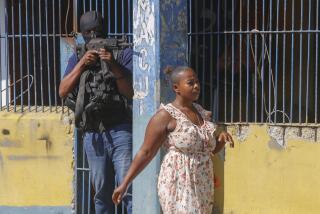Kabila Seeks New Government Amid Political Rivalries
- Share via
KINSHASA, Zaire — Fresh from his triumphant takeover of this benighted nation, Laurent Kabila failed for the second day Wednesday to form a new government as he and his aides sparred with the capital’s bitterly divided but deeply entrenched political leadership.
Kabila, who flew unannounced into Kinshasa after dark Tuesday, did not emerge or issue any statements Wednesday from his new headquarters at the plush riverside residence formerly used by Zairian prime ministers.
Although Kabila had said that by Tuesday he would unveil his government and his plans for a transition to democracy, members of his inner circle pleaded for time as they pushed past hordes of local politicians, businesspeople and others forced to stand behind ropes outside the Inter-Continental Hotel, where Kabila’s top advisors have set up offices.
“We are starting the second phase of our revolution, the reconstruction phase, so you can understand that [it] cannot go as quickly as the military phase,” said Bizima Karaha, Kabila’s foreign minister.
“We must find the most competent people,” agreed Babi Mbayi, the planning minister. “It’s a slow process.”
Babi said anyone who opposed former dictator Mobutu Sese Seko’s rule will be welcome to join the new government, but only as individuals and not as representatives of political parties. He declined to elaborate.
But his statement suggests that Kabila will follow the controversial model of his mentor, former guerrilla leader Yoweri Museveni, who shot his way into power in Uganda in 1986. Museveni was formally elected president last year, but he banned political parties from participating on grounds that they exploit ethnic and religious divisions and hinder reconciliation.
Diplomats here were largely sympathetic to Kabila’s slow search for a new government. “There’s 400 political parties here, and they all want to meet the big guy,” a Western envoy said. “After the first 20 or so, I’m sure it’s a big blur.”
An African ambassador agreed. “They’re trying to make the government as inclusive as possible,” he said. “The broader the base of government, the longer it takes.”
By most accounts, the chief obstacle to announcing the new administration is the yet-unsuccessful attempt to forge an alliance with Etienne Tshisekedi, a political opposition leader and former prime minister who retains a zealous following in Kinshasa.
A carful of armed guerrillas escorted Tshisekedi from his home to Kabila’s headquarters Wednesday afternoon, a day after the prickly politician insisted that Kabila’s aides must come to him. Results of the presumed meeting between the two rivals were not disclosed.
Tshisekedi was elected head of government at a constitutional convention in 1992 that was mostly ignored by Mobutu. His fervent supporters insist that he retains his authority and is thus entitled to name the Cabinet, not Kabila. Tshisekedi, in his usual style, has said nothing in public in weeks.
Kabila has publicly derided Tshisekedi in the past, describing him as a sellout for agreeing to serve as prime minister three times while Mobutu was still in power.
The dictator dumped him each time, most recently in April after Tshisekedi dismissed Mobutu’s cronies from the Cabinet and offered six key portfolios to Kabila’s Alliance of Democratic Forces for the Liberation of Congo-Zaire, which was then still at war with Mobutu.
Tshisekedi’s supporters applaud that independent streak, his years of nonviolent opposition to Mobutu and his reputed honesty in a culture where most Zairian politicians were bought off or co-opted. Scores gather around Tshisekedi’s villa each day, hoping for one of his rare and often enigmatic speeches.
“He has the confidence of the people, and they want to see him working,” explained Isidore Bolankendi, deputy secretary-general of Tshisekedi’s Union for Democracy and Social Progress party.
Mpaya Placide Mukendi, another party leader, complained that Kabila has already misread the city’s mood by staying behind closed doors. “It is time for him to speak up,” he said. “Kabila says he knows what our people want, and what they think. But we don’t know what’s on his mind.”
About 30 of Tshisekedi’s supporters angrily marched wearing party T-shirts and shouting political slogans Wednesday afternoon in the first sign of open political dissent against Kabila.
“If he doesn’t appoint him prime minister, the struggle will keep on!” yelled protester Ntumba Darius, 32, a jobless resident in one of the city’s battered slums. “We fought against President Mobutu, and we can fight again.”
Others roared agreement. “If Tshisekedi isn’t prime minister, we are ready to die,” hollered Musi Fanfan, 32, another unemployed man. “He represents the people.”
With Kinshasa still under military rule by a guerrilla army and Kabila still feted as a conquering hero, serious opposition appeared unlikely. Diplomats hope that Kabila’s government will include enough other parties to be credible even if Tshisekedi is not included.
“He’s an important actor, but he’s not the only one,” a European ambassador said. “He will be a thorn in their side, but he won’t be able to topple things.”
Meanwhile, the continent’s other icon of rebellion, South African President Nelson Mandela, came to Kabila’s defense. Speaking Wednesday to business leaders in Harare, Zimbabwe, Mandela blasted Western governments for pushing the new leader so fast.
“What is most strange is that some Western countries that have supported the most vicious dictators for decades are now, just after Kabila has taken the country for one day, taking it upon themselves to lecture him on democracy,” Mandela said.
More to Read
Sign up for Essential California
The most important California stories and recommendations in your inbox every morning.
You may occasionally receive promotional content from the Los Angeles Times.












